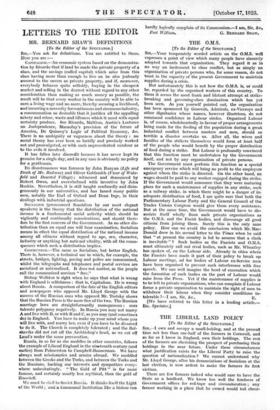LETTERS TO THE EDITOR MR. BERNARD SHAW'S DEFINITIONS [To the
Editor of the SPECTATOR.]
Srn,—You ask for definitions. You are entitled to them. Here you are :— CAprrAusst.—An economic system based on the demonstra- tion by Ricardo that if land be made the private property of a class, and the savings (called capital) which arise from this class having more than enough to live on be also jealously secured to the savers as private property, and if, moreover, everybody behaves quite selfishly, buying in the cheapest market and selling in the dearest without regard to any other consideration than making as much money as possible, the result will be that every worker in the country will be able to earn a living wage and no more, thereby securing a livelihood, and incurring a necessity for continuous and strenuous industry, a consummation so desirable that it justifies all the appalling mkery and crime, waste and idleness which it must with equal certainty produce. See Ricardo, Malthus, Austin's Lectures on Jurisprudence, Macaulay's prevision of the future of America, De Quincey's Logic of Political Economy, &e. There is no ambiguity or vagueness about the theory : no social theory has ever been so lucidly and precisely worked out and promulgated, or with such unprecedented candour as to the evils it involved.
It has fallen into discredit because it has never kept its promise for a single day, and in any cast is obviously no policy for a gentleman.
Its disastrousness was foreseen by John Bunyan (Life and
Death of Mr. Badman) and Oliver 'Goldsmith (Vicar of Wake- field and Deserted Village); witnessed and denounced by Robert Owen, and overwhelmed with invective by -John Ruskin. Nevertheless, it is still taught confusedly and disin- genuously in our universities, and has lamed many public men, notably the Earl of Oxford and Dean Inge, in their dealings with industrial questions.
SOCIALISM (pronounced Soashlism by our most elegant speakers) is the theory that the distribution of the national income is a fundamental social activity which should be vigilantly and continually conscientious, and should there- fore be the first concern of the Government. As no other dis- tribution than an equal one will bear examination, Socialism means in effect the equal distribution of the national income among all citizens without regard to age, sex, character, industry or anything but national vitality, with all the conse- quences which such a distribution implies.
Cosrmmsusu.—The same as Socialism, but better English.
There is, however, a technical use in which, for example, the streets, bridges, lighting, paving and police are communized, whilst the telegraphs and telephones and postal services are socialized or nationalized. It does not matter, as the people call the communized services " free."
Bishop Welldon is right when he says that what is wrong with England is selfishness : that is, Capitalism. He is wrong about Russia. A comparison of the fate of the English editors and newspapers who opposed Mr. Lloyd George with the success of the Russian ones who opposed Mr. Trotsky shows that the Russian Press is the more free of the two. The Russian marriage laws are straightforwardly monogamous : ours tolerate polygamy negatively. In Russia you may not marry A and live with B, or with B and C, as you may (and sometimes do) in England. You have to make up your mind whom you will live with, and marry her, even if you have to be divorced to do it. The Church is completely tolerated ; and the Bol- sheviks did not cut off the Archbishop's head, as we cut off Laud's under the same provocation.
Russia, in so far as she meddles in other countries, follows the example of Liberal England in the nineteenth century (and earlier) from Palmerston to Campbell-Bannerman. We have always sent missionaries and armies abroad. We meddled between the'Greeks and the Turks, and between the Turks and the Ruisians, backing our interests and sympathies every- where unhesitatingly. " The Gold of Pitt " is far more famous, and certainly mostly less mythical, than the gold of Zinovieff.
We must be civil to Soviet Russia. It thinks itself the Light of the World ; and a Communal Institution like a bishop can
hardly logically complain of its Communism.—I am, Sir, &c1


















































 Previous page
Previous page